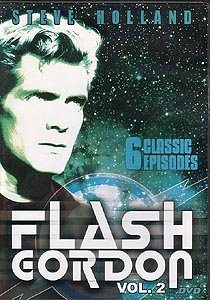Flash Gordon B.S. (Bad Science)

OK, I ain’t a scientist. But I can smell bad science a light year away.
Case in point: an episode of the live action Flash Gordon TV series from the 1950s entitled “The Lure of Light.” (At first I thought the episode was called “The Lurid Light,” but that would have been more appropriate for another character, Flesh Gordon.) In this episode earth scientists have discovered a way to make a spaceship travel faster than the speed of light.
A bit of background info for Those Not In The Know: this Flash Gordon TV series takes place in the future where travel between planets can be accomplished in a matter of hours, except for long hauls that may take a few days. Our hero Flash works for GBI – the Galactic Bureau of Investigation – that operates like an interplanetary FBI, enforcing the law throughout the galaxy. Operating out of GBI headquarters on earth, Flash takes off in an old-style sci fi fuel-powered rocket, complete with a fiery exhaust, to fight various thieves and tyrants.
OK, this was a low budget show from the early days of TV. I can cut it some slack – up to a point. Apparently to save money the show was shot for a while in West Berlin. You can detect that German accent with some of the supporting actors. In fact, it’s really noticeable when a bad guy is portrayed by a West Berliner (“Vot is dis? Flash Gordon!”) It reminds one of those one-sided WWII movies where brave American soldiers fought evil but stupid Nazis.
But I’m not here to discuss the history of jingoistic entertainment. Let’s get back to the “science” found in this episode.
I must admit I only seen a few episodes of this TV series, but I’m pretty sure that such concepts as tachyon drives, wormholes, or hyperspace weren’t used to explain how Flash got around the galaxy so swiftly with his fuel-powered rocketship. So if earth has just discovered FTL travel, how has Flash been traveling to other planets like Saturn within hours, not months or years?
But there’s more B.S.
Take the FTL rocket, complete with its fiery exhaust. During a demonstration the unmanned rocket achieves faster than light speed via remote control. As it nears the speed of light, it is shown stretching in length as viewed from earth before it disappears. I thought Einstein’s theory of relativity states that an object would shorten in length, contracting to the size of a dot at near light speed. If it somehow attained light speed, it would then have infinite mass, needing infinite energy to keep going.
Anyway, Flash volunteers to travel on board the remote controlled FTL rocket, despite the unknown dangers. In the meantime, his fellow GBI agent, Dale Arden, is abducted by an evil queen on another planet. This queen is trying to learn the secret of FTL travel. Flash uses the experimental rocket to travel to where Dale is being interrogated, but he arrives too late: she’s dead.
So he jumps back into the super rocket and with GBI HQ on earth remotely controlling it, he travels faster than the speed of light, hoping that he will move backward it time. At hyper-light-speed he watches the clock on board his ship race in reverse; he gains about three hours and then tells earth to cut the FTL drive. Using the extra time he arrives earlier to prevent Dale’s death.
OK, that opens up that can of worms called Time Travel Paradoxes. But let me pick on the most obvious problem regarding the theory of relativity.
As stated in the show, the FTL rocket is remotely controlled from Earth. Flash watches the onboard clock, waits to gain enough time, and then tells earth control via radio to cut off the light speed drive.
From what I remember of Einstein’s stuff, as a spaceship approaches light speed, time dilation occurs. Relative to the planet earth, time on the ship moves slower, even though the crew on board doesn’t notice any changes from their POV. So how can Flash be on his ship just before it hits light speed, communicating with earth without any time dilation effect?
And better yet, there’s this time travel paradox: how can Flash be in contact with earth three hours earlier than when he originally left?


Comments